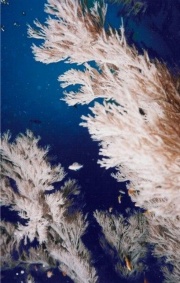Difference between revisions of "Black coral"
Jump to navigation
Jump to search
m (Text replace - "== Authority ==" to "== Sources Checked for Data in Record ==") |
|||
| Line 12: | Line 12: | ||
O. Untracht,''Jewelry Concepts and Technology'', Doubleday & Co., Inc., New York, 1985. | O. Untracht,''Jewelry Concepts and Technology'', Doubleday & Co., Inc., New York, 1985. | ||
| − | == | + | == Sources Checked for Data in Record == |
* ''Encyclopedia Britannica'', http://www.britannica.com Comment: "Coral." Encyclopædia Britannica. 22 Jan. 2004 . | * ''Encyclopedia Britannica'', http://www.britannica.com Comment: "Coral." Encyclopædia Britannica. 22 Jan. 2004 . | ||
Revision as of 13:08, 29 April 2016
Description
Any of several types of rare black-color Coral. Black coral occurs as featherlike or treelike formations. They grow in the Mediterranean Sea, the Caribbean Sea, the Gulf of Mexico near Panama, off the coast of southeastern Asia and Japan and in the Indian Ocean. Carved pieces of black coral appeared similar to Horn and can be polished to a high gloss (Untracht 1985).
Synonyms and Related Terms
akabar; giojetto
Additional Information
O. Untracht,Jewelry Concepts and Technology, Doubleday & Co., Inc., New York, 1985.
Sources Checked for Data in Record
- Encyclopedia Britannica, http://www.britannica.com Comment: "Coral." Encyclopædia Britannica. 22 Jan. 2004 .
- G.S.Brady, Materials Handbook, McGraw-Hill Book Co., New York, 1971 Comment: p.235
- Oppi Untracht, Jewelry Concepts and Technology, Doubleday & Co., Inc., New York City, 1985
